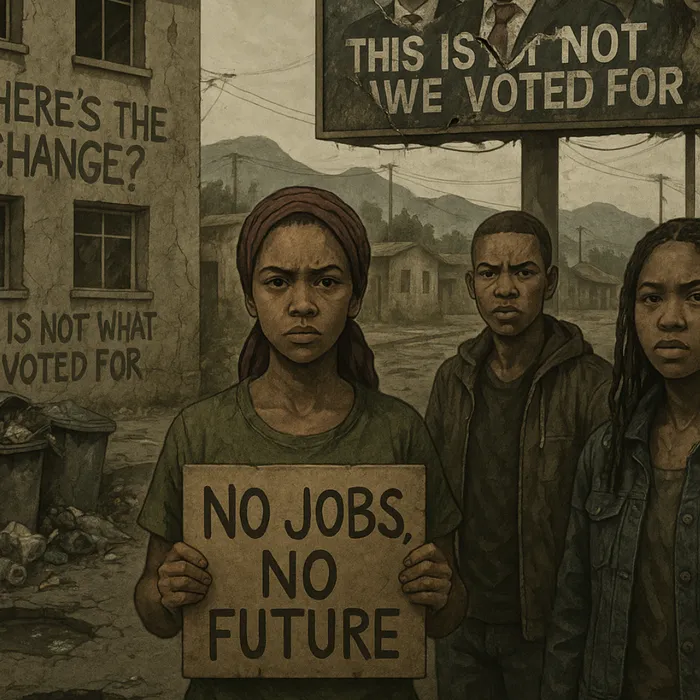Youth Month 2025: Why jobless marches signal a crisis for South Africa's future

Trapped by unemployment, South African youth are turning hustle into survival.
Image: SoraAI
Every June, South Africa commemorates Youth Month, a time to celebrate the energy, promise, and resilience of the country’s young people. It is meant to honour their contributions, highlight their potential, and galvanise national efforts to uplift the youth.
But in 2025, Youth Month feels less like a celebration and more like a cry of despair. Instead of rallies filled with hope and vision, the streets echo with the footsteps of jobless marches - a stark reminder that South Africa’s youth are losing momentum, opportunities, and faith in a future promised but not delivered. South Africa’s youth make up nearly 40% of the population, representing the greatest reservoir of energy and potential for growth.
The country’s future depends on its education, employment, and empowerment. Yet, the harsh truth is that millions of young South Africans face a bleak reality - unemployment rates remain staggering, estimated to be over 50% for youth aged 15 to 34. Many more are underemployed or stuck in precarious jobs with no security or career advancement opportunities.
Despite government pledges, policy reforms, and youth development programmes, the system seems to be failing those it most needs to serve. The usual celebrations around Youth Day - commemorating the 1976 Soweto Uprising, when young students took a stand against apartheid oppression - are now overshadowed by large-scale protests and marches. These are not just calls for jobs, but desperate demands for dignity, opportunity, and recognition.
In 2025, Youth Month has been marked by increased jobless marches across major cities like Johannesburg, Free State, and Durban. These protests highlight the frustration of a generation that feels abandoned by both the government and the private sector. They march not out of choice, but out of necessity — to make visible their struggles and to demand urgent action. What makes this crisis particularly dangerous is the risk of alienation and disillusionment. When young people feel excluded from economic participation, they become vulnerable to social instability, crime, and political radicalisation. The energy of the youth, if not harnessed positively, can easily be channelled into unrest rather than nation-building.
A critical part of the problem lies in the education system and skills mismatch. While South Africa produces thousands of graduates every year, many young people find that their qualifications do not align with the demands of the labour market. Technical and vocational training, which could provide immediate pathways into jobs, remains underdeveloped and underfunded. Meanwhile, economic growth remains sluggish, with insufficient job creation in sectors that can absorb young labour.
The informal economy is booming, but it often lacks stability, social protection, and prospects for advancement. This creates a generation stuck in a state of survival rather than one that thrives.The government must urgently rethink its approach. Token youth employment schemes and half-hearted initiatives will no longer suffice. Meaningful engagement with young people is needed to bridge the gap between education and employment. This requires comprehensive policies that connect education, skills development, and job creation in a seamless and coordinated way. Businesses need to be incentivised to create sustainable jobs explicitly targeted at youth, while entrepreneurship and innovation among young people must be supported with access to finance, mentorship, and networks. Structural issues such as corruption, bureaucracy, and uneven regional development that hinder opportunities must also be addressed to create a level playing field for all. The private sector has a critical role to play.
Beyond corporate social responsibility programmes, companies must integrate youth development into their core business strategies. Investing in internships, apprenticeships, and entry-level opportunities can create pipelines for long-term careers, ensuring that young people are not just temporarily employed but set up for sustainable success. This is not just charity; it is an investment in the future workforce and the broader economy. The future of South Africa depends on treating young people as partners in nation-building rather than pawns in political games or mere recipients of charity. It is their energy, creativity, and determination that can drive innovation, economic growth, and social progress — if only given the tools and opportunities.
Youth Month 2025 should serve as a wake-up call for policymakers, business leaders, and society at large. The continued wave of jobless marches is a clear signal that the status quo is failing. The frustration and anger on the streets are not random or isolated — they reflect deep systemic failures and urgent unmet needs. We cannot afford to ignore this any longer.If South Africa wants to reclaim Youth Month as a true celebration of its youth, then urgent, coordinated action is needed now. Otherwise, the country risks losing the very generation that holds the key to its future.
**** The views expressed do not necessarily reflect the views of IOL or Independent Media.
Related Topics: